What do you learn in culinary school?
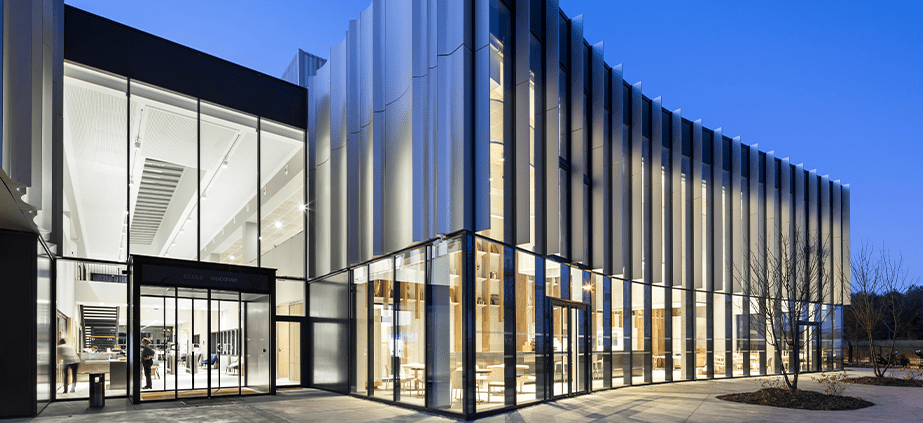
Culinary school is often the first port of call for many aspiring chefs. Whether you have your heart set on becoming a chef or a pastry chef, understanding how to get into cooking and learning what culinary school teaches you can help you make informed decisions about whether culinary school is right for you.
At École Ducasse, we take great pride in teaching our students a culinary arts curriculum that provides them with a wealth of practical, hands-on training. To help you answer the question “what do you learn in culinary school?”, we share everything you need to know in this blog.
Introduction to culinary arts
Culinary arts teaches you how to prepare ingredients, cook delicious mouth-watering meals, perfect the presentation of dishes, and enrich the dining experience for customers. For many, this makes culinary careers incredibly rewarding and exciting.
If you dream of attending culinary school, culinary classes will give you a chance to explore food science and culinary arts concepts, as well as gain insights from top chefs to master skills such as balancing flavors, food pairing, and sourcing local and global ingredients.
When wondering what you learn in culinary school, remember that becoming a great chef goes beyond crafting appetizing and flavorsome dishes. You also need to know how to run a restaurant and create menus, which is why culinary arts also touch on life and business skills.
Short history of cooking and cuisine
Cooking and cuisine, as we know, is not new. Humans began cooking almost one million years ago. Of course, culinary tradition then wasn’t what we know it to be now. The history of cooking offers us a glimpse of early humans hunting animals and foraging for plants that could be eaten raw or cooked over a fire.
As time went on and travel across the globe became possible, European explorers began to learn more about the cuisines, ingredients, and cooking methods in countries such as India and regions like Asia. Gradually, local cuisines evolved into distinct disciplines. As vegetables, fruits, herbs, spices, and meats were imported and exported worldwide, cooking techniques began to become more specialized.
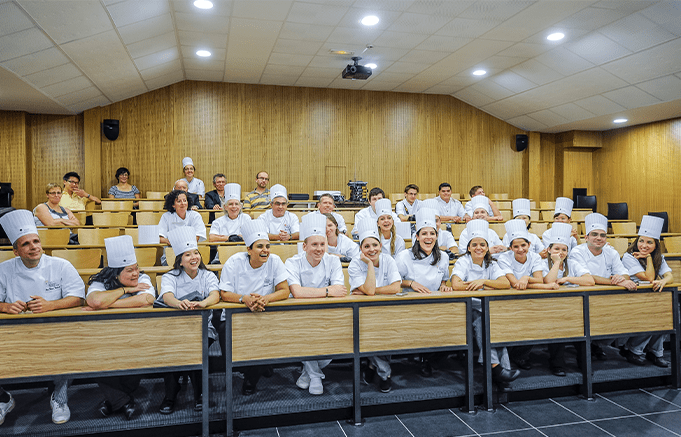
What are the first things you learn in culinary school?
Regardless of whether you’re hoping to study a culinary arts Bachelor degree, a Bachelor degree in baking and pastry arts, or a diploma program, starting a culinary arts program is a fascinating and eye-opening experience.
You can expect to discover how to run a restaurant, prepare dishes, lead a team, and learn other skills in the catering and hospitality industries. But to kick-start your learning, the first things you’ll cover in culinary school are the fundamentals of cooking including the following.
- Knife skills and how to handle different types of knives: Before you begin preparing dishes, you’ll familiarize yourself with the knives you’ll use throughout your culinary career and how to handle them.
- Understanding different ingredients: Having learned the basics of knife skills, your culinary arts curriculum will teach you how to cook and incorporate different ingredients into your dishes.
- Cooking techniques for different food groups: Practical learning will also equip you with the skills to cook different food groups, such as fruit and vegetables, meat and other proteins, and dairy products.
- Essential tools to manage and market your restaurant: This includes learning about restaurant finance, such as budgeting and managing costs, as well as understanding different marketing tactics for social media, including search engine optimization (SEO), email campaigns, social media marketing and other digital strategies. Additionally, you will learn how to manage suppliers, negotiate contracts and organize events. All of these skills are essential for running a successful restaurant.
Do you dream of a career as a pastry chef? When considering what you learn in culinary school, here are some of the first things you can expect to cover.
- How to create pastries such as shortcrust, puff, filo, and choux
- Different cooking materials for baking pastries
- How to make pastries of varying volumes and shapes
- Using color in your cooking
Once you’ve covered the fundamentals of cooking, you’ll also begin to learn more about:
- Preparing and cooking dishes from various cuisines
- Planning menus such as á la carte and du jour
- Managing a professional kitchen and those working within it
- Hygiene and food safety regulations that restaurateurs must adhere to. Running a restaurant or business within the food industry
- Supply operations
- Culinary services
It's worth noting that internships are a great way for culinary school graduates to gain valuable experience in the industry. Many of the top culinary schools offer internships at some of the best restaurants around, allowing students to work alongside experienced chefs and perfect their techniques with the help of top-tier professionals. Internships can also provide a culinary student with invaluable contacts that can help them launch their career.
The quality of your culinary school's faculty also plays a significant role in the development of your skills as a chef. At reputable schools, you will find highly experienced and well-regarded chefs who are passionate about imparting their knowledge to the culinary school student they’re teaching. This means you will be exposed to all the latest techniques, trends and developments in the culinary world. With such highly experienced teachers guiding you, you can rest assured that you'll leave with a set of skills that will increase your chances of finding work in top kitchens or launching your own business successfully.
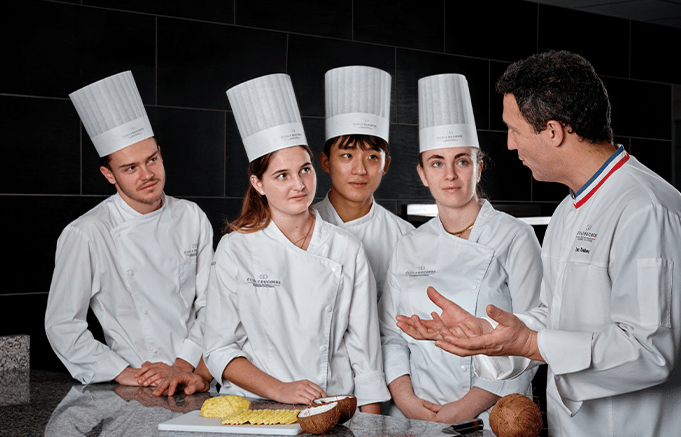
Expanding your culinary arts skill-set
If you’re hoping to learn how to get into cooking and attend culinary school, you may already have some experience in the kitchen. But improving knowledge and skills is a vital part of culinary school.
Under the guidance of industry-leading experts, you’ll start by learning how to use different cooking equipment. You’ll also be encouraged to create dishes, follow new recipes, and learn new skills and techniques.
Fundamentals of cooking
To help you expand your culinary skill set and encourage you to step out of your comfort zone in the kitchen, your time in culinary school will help you learn how to combine ingredients and perfect stocks, sauces, and dressings.
Learning the fundamentals of cooking through culinary professional internships will also teach you:
- How to cook proteins and different meats
- Methods for preparing fruit and vegetables
- Cooking carbohydrates such as pasta
- Using utensils for varying cooking methods
- Ingredient substitutions and alternatives
Knife skills and cooking techniques
As you progress through culinary school, you’ll learn how to handle and use the many different types of knives available in the kitchen. From the general-purpose chef and Santoku knives to the Japanese deba knife designed for fileting fish, you’ll soon find yourself using a range of knives with ease.
In addition to improving your knife skills, you’ll grasp cooking techniques such as:
- Grilling
- Broiling
- Roasting
- Poaching
- Braising
- Searing
- Blanching
- Steaming
- Simmering
- Frying
- Sautéing
- Baking
Baking and pastry arts
Do you dream of following in the footsteps of pâtissiers such as Pierre Hermé and Jordi Roca? Do you aspire to make delightful desserts and pastries that customers can’t get enough of?
When wondering what do you learn in culinary school, attending a pastry chef school will teach you everything you need to know about:
- Mastering the art of pastry, bread, and dessert making
- Baking techniques to perfect pastries
- Creating exquisite chocolates and other confectionery items
- Making gâteaux and other desserts
- Creativity when decorating and plating pastries
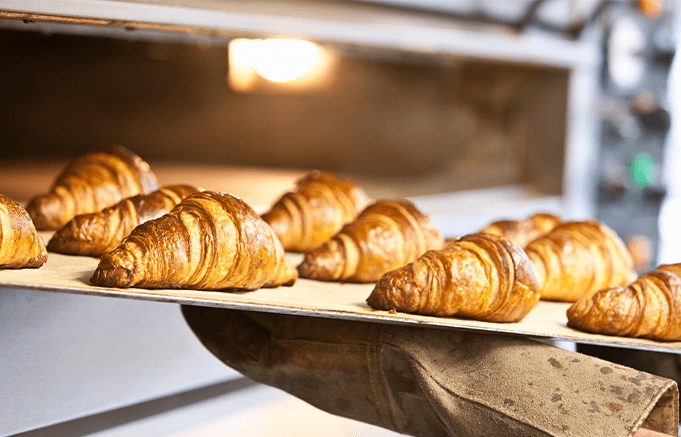
Menu planning and kitchen management
When you think of how to get into cooking and turn your thoughts to ‘what does culinary school teach you’, you’ll likely imagine planning and designing succulent and unique menus for your customers.
But did you know that menu planning also includes considering budget constraints, analyzing the environment, and learning more about customer needs?
To ensure you have what it takes to make it as a professional chef, culinary school teaches you everything you need to know about how to cost the use of high-quality goods, external factors that may affect product availability, and customer needs and trends that could influence your menu.
In addition, culinary school teaches you how to manage a kitchen, covering factors including:
- Running a company and kitchen
- The day-to-day management of staff
- Staff training
- Hygiene and safety regulations
- A global strategy that can support you in understanding customer needs
Local and global cuisines
Italian, French, Japanese, Thai, Lebanese, Spanish, Korean, Caribbean, modern British, and Mexican are just some of the global cuisines that have become popular. Any budding or professional chef will need to learn the different cooking techniques that each cuisine incorporates.
Through hands-on training, culinary school will cover everything you need to know about local and global cuisines. Not only will this equip you with the necessary skills to work in restaurants worldwide, but it’ll also ensure that you can incorporate global ingredients into your menu.
Leadership and teamwork in the kitchen
Becoming a professional chef goes beyond learning knife skills, pastry arts, and menu planning. What separates some of the best chefs is their leadership skills and ability to work collaboratively with others, whether as a chef de partie, pâtissier, or commis chef.
Knowing just how important teamwork is within any kitchen, culinary schools such as ours provide hands-on experience and internships that offer real-world insights and knowledge that you can use throughout an exciting career.
You’ll also learn leadership skills such as communication, organization, and decision-making to guarantee kitchen operations run as smoothly as possible.
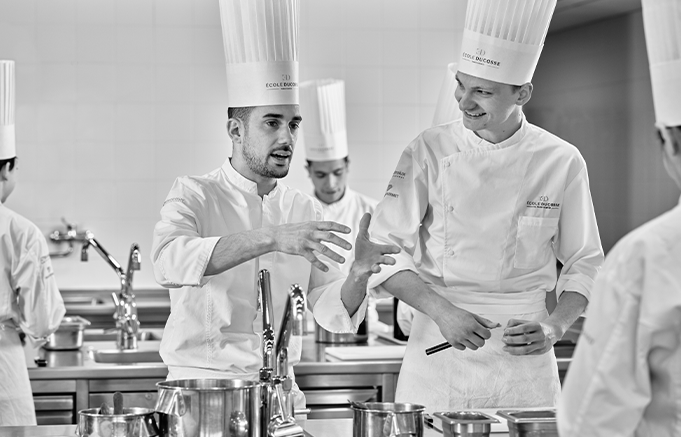
Prepare to become a professional chef
If you dream of becoming the next Pierre Gagnaire, Gordon Ramsay, or Yoshihiro Murata, asking ‘what do you learn in culinary school' is a great place to start before applying for a culinary program in the form of a Bachelor’s or other qualification.
During your time in school, a culinary arts curriculum will offer you a comprehensive education to become a professional chef.
Ready to find out what can you do with a culinary degree and learn whether a chef is a good career? At École Ducasse, we’re here to support you.
Your career as a professional chef starts here
Obtain hands-on experience, master the art of cooking, and learn how to manage and run your own restaurant with our bachelor’s in culinary arts.
Take the first step in your career as a professional chef and learn more about our degree today.
Master the art of exquisite pastries at École Ducasse
Perfect your pastry art skills, learn new techniques from top chefs, and acquire the skills to become a leading pastry chef with our bachelor in French pastry arts.
Learn more about our bachelor’s degree in baking and pastry arts.


